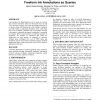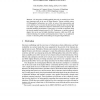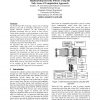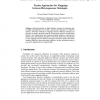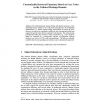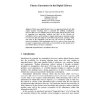108
click to vote
SIGIR
1999
ACM
15 years 6 months ago
1999
ACM
User interfaces for digital libraries tend to focus on retrieval: users retrieve documents online, but then print them out and work with them on paper. One reason for printing doc...
110
click to vote
DL
2000
Springer
15 years 6 months ago
2000
Springer
A preliminary study was conducted to help understand the purpose of digital libraries (DLs) and to investigate whether meaningful results could be obtained from small user studies...
130
click to vote
DL
2000
Springer
15 years 6 months ago
2000
Springer
Digital library research is mostly focused on the generation of large collections of multimedia resources and state-ofthe-art tools for their indexing and retrieval. However, digi...
148
click to vote
ADBIS
2000
Springer
15 years 6 months ago
2000
Springer
The integration of bibliographical data today is considered one of the most important tasks in the area of digital libraries. Various available sources of bibliographical informati...
117
Voted
ICMCS
2000
IEEE
15 years 6 months ago
2000
IEEE
The growth of computer networks has boosted the growth of the information technology sector to a greater extent. There is a trend to move from conventional libraries to digital li...
122
Voted
ACSAC
2000
IEEE
15 years 6 months ago
2000
IEEE
The World Wide Web is playing a major role in reducing business costs and in providing convenience to users. Digital Libraries capitalize on this technology to distribute document...
122
click to vote
ERCIMDL
2001
Springer
15 years 6 months ago
2001
Springer
Ordering principles of digital libraries expressed in ontologies may be highly heterogeneous even within a domain and especially over different cultures. Automatic methods for mapp...
129
Voted
ERCIMDL
2001
Springer
15 years 6 months ago
2001
Springer
The cultural heritage domain dealing with digital surrogates of rare and fragile historic artifacts is one of the most promising areas for establishing collaboratories, i.e. shared...
102
click to vote
ERCIMDL
2001
Springer
15 years 6 months ago
2001
Springer
Abstract. Clinical requirements for quick accessibility to reputable, up-todate information have increased the importance of web accessible digital libraries for this user communit...
110
Voted
ERCIMDL
2009
Springer
15 years 7 months ago
2009
Springer
While many digital libraries focus on supporting defined tasks that require targeted searching, there is potential for enabling serendipitous discovery that can serve multiple purp...
